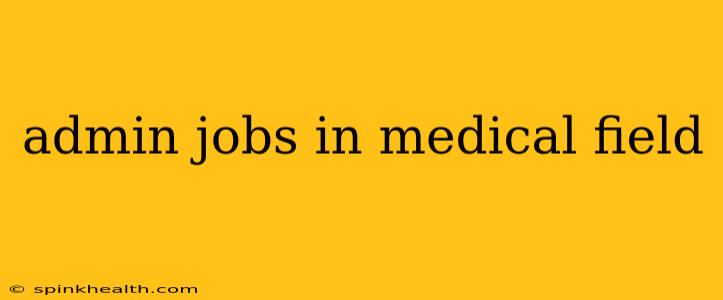Charting a Course: A Guide to Admin Jobs in the Medical Field
The crisp scent of antiseptic, the quiet hum of machinery, the reassuring presence of dedicated professionals – the medical field is a world of its own. And behind the scenes, ensuring the smooth operation of this vital ecosystem, are the unsung heroes of medical administration. If you’re looking for a career that combines organizational prowess with a deep sense of purpose, then admin jobs in the medical field might just be your perfect prescription.
This isn't just about filing and paperwork; it's about being a critical part of a team that impacts lives every day. From bustling hospitals to cozy private practices, the variety of roles is as diverse as the patients they serve. Let's explore the landscape of medical administration, delving into the specific roles, required skills, and potential career paths.
What are some common administrative jobs in the medical field?
The medical field offers a vast array of administrative positions, each with its own unique responsibilities and challenges. Some of the most common roles include:
-
Medical Office Manager: Think of them as the conductor of an orchestra. Medical office managers oversee the day-to-day operations of a clinic or practice, managing staff, scheduling appointments, handling finances, and ensuring compliance with regulations. It's a demanding but rewarding role for those who thrive in a fast-paced environment.
-
Medical Secretary/Receptionist: The first point of contact for patients, medical secretaries and receptionists are the friendly faces who greet patients, answer phones, schedule appointments, manage medical records, and handle insurance claims. Excellent communication and interpersonal skills are crucial here.
-
Medical Billing and Coding Specialist: This crucial role involves translating medical diagnoses and procedures into numerical codes for insurance billing. Accuracy is paramount, as errors can lead to significant financial consequences for both the practice and the patient. A strong understanding of medical terminology and insurance regulations is a must.
-
Health Information Technician: These professionals manage and maintain patient medical records, ensuring their accuracy and confidentiality. They might work in hospitals, clinics, or insurance companies, playing a key role in ensuring patient data privacy and accessibility.
What skills are needed for medical administrative jobs?
Beyond technical skills, certain personality traits and soft skills are highly valued in the medical administrative field. These include:
- Strong organizational skills: Managing multiple tasks, prioritizing effectively, and maintaining meticulous records are essential.
- Excellent communication skills: Interacting professionally with patients, doctors, and insurance companies requires clear and concise communication, both written and verbal.
- Proficiency in medical terminology: Understanding medical jargon is crucial for many roles within medical administration.
- Computer literacy: Most medical administrative jobs require proficiency in various software programs, including electronic health record (EHR) systems.
- Detail-oriented: Accuracy is paramount in many aspects of medical administration, from billing and coding to record-keeping.
- Empathy and compassion: Working in a healthcare setting requires understanding and compassion for patients and their families.
How much do medical administrative jobs pay?
Salaries vary considerably depending on the specific role, location, experience, and employer. Entry-level positions like medical secretaries might earn a starting salary in a specific range, while experienced medical office managers can command significantly higher compensation. Researching salary data for your specific location and desired role is highly recommended.
What education and certifications are needed for medical administrative jobs?
Many medical administrative jobs require a high school diploma or equivalent, but a post-secondary education can significantly enhance career prospects. Associate's degrees in medical administration or related fields are common, and some roles may require specific certifications, such as Certified Medical Assistant (CMA) or Registered Medical Assistant (RMA).
What is the job outlook for medical administrative jobs?
The job outlook for medical administrative jobs is generally positive, driven by the ever-growing healthcare industry. As the population ages and the demand for healthcare services increases, the need for skilled medical administrators will likely continue to rise.
This journey into the world of medical administration is just the beginning. With dedication, the right skills, and a passion for helping others, you can carve out a fulfilling and impactful career in this essential field. Remember to research specific roles and requirements thoroughly before embarking on your application process. The medical field welcomes those ready to contribute – are you ready to answer the call?

